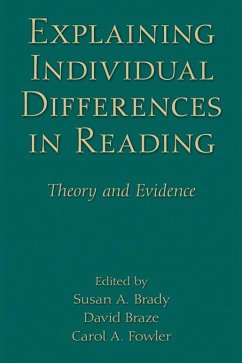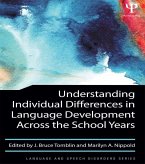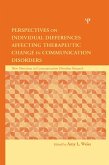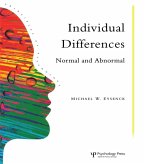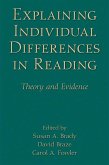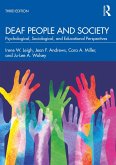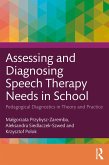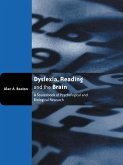Explaining Individual Differences in Reading (eBook, ePUB)
Theory and Evidence
Redaktion: Brady, Susan A.; Fowler, Carol A.; Braze, David
54,95 €
54,95 €
inkl. MwSt.
Sofort per Download lieferbar

27 °P sammeln
54,95 €
Als Download kaufen

54,95 €
inkl. MwSt.
Sofort per Download lieferbar

27 °P sammeln
Jetzt verschenken
Alle Infos zum eBook verschenken
54,95 €
inkl. MwSt.
Sofort per Download lieferbar
Alle Infos zum eBook verschenken

27 °P sammeln
Explaining Individual Differences in Reading (eBook, ePUB)
Theory and Evidence
Redaktion: Brady, Susan A.; Fowler, Carol A.; Braze, David
- Format: ePub
- Merkliste
- Auf die Merkliste
- Bewerten Bewerten
- Teilen
- Produkt teilen
- Produkterinnerung
- Produkterinnerung

Bitte loggen Sie sich zunächst in Ihr Kundenkonto ein oder registrieren Sie sich bei
bücher.de, um das eBook-Abo tolino select nutzen zu können.
Hier können Sie sich einloggen
Hier können Sie sich einloggen
Sie sind bereits eingeloggt. Klicken Sie auf 2. tolino select Abo, um fortzufahren.

Bitte loggen Sie sich zunächst in Ihr Kundenkonto ein oder registrieren Sie sich bei bücher.de, um das eBook-Abo tolino select nutzen zu können.
This volume focuses on a wide array of current research topics, examining the scope, limits and implications of phonological theory in research into reading development and reading disabilities. It provides an essential resource for researchers interested in the cognitive foundations of reading and literacy and those working in reading and learning disabilities.
- Geräte: eReader
- mit Kopierschutz
- eBook Hilfe
- Größe: 3.56MB
Andere Kunden interessierten sich auch für
![Understanding Individual Differences in Language Development Across the School Years (eBook, ePUB) Understanding Individual Differences in Language Development Across the School Years (eBook, ePUB)]() Understanding Individual Differences in Language Development Across the School Years (eBook, ePUB)52,95 €
Understanding Individual Differences in Language Development Across the School Years (eBook, ePUB)52,95 €![Perspectives on Individual Differences Affecting Therapeutic Change in Communication Disorders (eBook, ePUB) Perspectives on Individual Differences Affecting Therapeutic Change in Communication Disorders (eBook, ePUB)]() Perspectives on Individual Differences Affecting Therapeutic Change in Communication Disorders (eBook, ePUB)52,95 €
Perspectives on Individual Differences Affecting Therapeutic Change in Communication Disorders (eBook, ePUB)52,95 €![Individual Differences (eBook, ePUB) Individual Differences (eBook, ePUB)]() Michael W. EysenckIndividual Differences (eBook, ePUB)41,95 €
Michael W. EysenckIndividual Differences (eBook, ePUB)41,95 €![Explaining Individual Differences in Reading (eBook, PDF) Explaining Individual Differences in Reading (eBook, PDF)]() Explaining Individual Differences in Reading (eBook, PDF)54,95 €
Explaining Individual Differences in Reading (eBook, PDF)54,95 €![Deaf People and Society (eBook, ePUB) Deaf People and Society (eBook, ePUB)]() Irene W. LeighDeaf People and Society (eBook, ePUB)59,95 €
Irene W. LeighDeaf People and Society (eBook, ePUB)59,95 €![Assessing and Diagnosing Speech Therapy Needs in School (eBook, ePUB) Assessing and Diagnosing Speech Therapy Needs in School (eBook, ePUB)]() Malgorzata Przybysz-ZarembaAssessing and Diagnosing Speech Therapy Needs in School (eBook, ePUB)27,95 €
Malgorzata Przybysz-ZarembaAssessing and Diagnosing Speech Therapy Needs in School (eBook, ePUB)27,95 €![Dyslexia, Reading and the Brain (eBook, ePUB) Dyslexia, Reading and the Brain (eBook, ePUB)]() Alan BeatonDyslexia, Reading and the Brain (eBook, ePUB)55,95 €
Alan BeatonDyslexia, Reading and the Brain (eBook, ePUB)55,95 €-
-
-
This volume focuses on a wide array of current research topics, examining the scope, limits and implications of phonological theory in research into reading development and reading disabilities. It provides an essential resource for researchers interested in the cognitive foundations of reading and literacy and those working in reading and learning disabilities.
Hinweis: Dieser Artikel kann nur an eine deutsche Lieferadresse ausgeliefert werden.
Dieser Download kann aus rechtlichen Gründen nur mit Rechnungsadresse in A, B, BG, CY, CZ, D, DK, EW, E, FIN, F, GR, HR, H, IRL, I, LT, L, LR, M, NL, PL, P, R, S, SLO, SK ausgeliefert werden.
Hinweis: Dieser Artikel kann nur an eine deutsche Lieferadresse ausgeliefert werden.
Produktdetails
- Produktdetails
- Verlag: Taylor & Francis eBooks
- Seitenzahl: 292
- Erscheinungstermin: 9. Mai 2011
- Englisch
- ISBN-13: 9781136732836
- Artikelnr.: 38271974
- Verlag: Taylor & Francis eBooks
- Seitenzahl: 292
- Erscheinungstermin: 9. Mai 2011
- Englisch
- ISBN-13: 9781136732836
- Artikelnr.: 38271974
- Herstellerkennzeichnung Die Herstellerinformationen sind derzeit nicht verfügbar.
Susan Brady is a Professor of Psychology at the University of Rhode Island. Her basic research focuses primarily on phonological factors in reading ability. In addition, in applied research she investigates the ingredients, such as teacher knowledge, necessary for improving reading achievement in the primary grades. David Braze, a linguist, concentrates his research on the cognitive bases underlying ability to comprehend speech and print. He employs online methods, including monitoring eye-movements during reading, to investigate bottlenecks in comprehension. Likewise, he explores how characteristics of text interact with individual differences in cognitive factors to impact reading comprehension. Carol Fowler is a Professor of Psychology at University of Connecticut. Her research includes an emphasis on the relation between speech production and perception, and the implications of that relation for phonological theory. One aspect of that research explores the nature of the phonological structures accessed by skilled readers of a variety of writing systems. The three editors are all Senior Scientists at Haskins Laboratories in New Haven, Connecticut.
Foreword by William Tunmer. Preface. Part 1. Theoretical Foundations:
Phonology and Reading. C.A. Fowler, How Theories of Phonology May Enhance
Understanding of the Role of Phonology in Reading Development and Reading
Disability. Part 2. Phonological Factors in Learning to Read. D. Braze,
G.W. McRoberts, C. McDonough, Early Precursors of Reading-Relevant
Phonological Skills. D.L. Share, On the Role of Phonology in Reading
Acquisition: The Self-Teaching Hypothesis. S.A. Brady, Efficacy of Phonics
Teaching for Reading Outcomes: Indications from Post NRP Research. N.
Patton Terry, H. Scarborough, The Phonological Hypothesis as a Valuable
Framework for Studying the Relation of Dialect Variation to Early Reading
Skills. Part 3. Sources of Individual Differences Beyond Phonological
Deficits . M.J. Snowling, Beyond Phonological Deficits: Sources of
Individual Differences in Reading Disability. H.W. Catts, S. Adlof,
Phonological and Other Language Deficits Associated with Dyslexia. C.
Perfetti, Phonology is Critical in Reading -- But a Phonological Deficit is
Not the Only Source of Low Reading Skill. Part 4. Unraveling the Biology of
Reading and Reading Differences. B. Byrne, Evaluating the Role of
Phonological Factors in Early Literacy Development: Insights from
Experimental and Behavior-Genetic Studies. R. Olson, Genetic and
Environmental Influences on Phonological Abilities and Reading Achievement.
J.J. Diehl, S.J. Frost, W.E. Mencl, K.R. Pugh, Neuroimaging and the
Phonological Deficit Hypothesis.
Phonology and Reading. C.A. Fowler, How Theories of Phonology May Enhance
Understanding of the Role of Phonology in Reading Development and Reading
Disability. Part 2. Phonological Factors in Learning to Read. D. Braze,
G.W. McRoberts, C. McDonough, Early Precursors of Reading-Relevant
Phonological Skills. D.L. Share, On the Role of Phonology in Reading
Acquisition: The Self-Teaching Hypothesis. S.A. Brady, Efficacy of Phonics
Teaching for Reading Outcomes: Indications from Post NRP Research. N.
Patton Terry, H. Scarborough, The Phonological Hypothesis as a Valuable
Framework for Studying the Relation of Dialect Variation to Early Reading
Skills. Part 3. Sources of Individual Differences Beyond Phonological
Deficits . M.J. Snowling, Beyond Phonological Deficits: Sources of
Individual Differences in Reading Disability. H.W. Catts, S. Adlof,
Phonological and Other Language Deficits Associated with Dyslexia. C.
Perfetti, Phonology is Critical in Reading -- But a Phonological Deficit is
Not the Only Source of Low Reading Skill. Part 4. Unraveling the Biology of
Reading and Reading Differences. B. Byrne, Evaluating the Role of
Phonological Factors in Early Literacy Development: Insights from
Experimental and Behavior-Genetic Studies. R. Olson, Genetic and
Environmental Influences on Phonological Abilities and Reading Achievement.
J.J. Diehl, S.J. Frost, W.E. Mencl, K.R. Pugh, Neuroimaging and the
Phonological Deficit Hypothesis.
Foreword by William Tunmer. Preface. Part 1. Theoretical Foundations:
Phonology and Reading. C.A. Fowler, How Theories of Phonology May Enhance
Understanding of the Role of Phonology in Reading Development and Reading
Disability. Part 2. Phonological Factors in Learning to Read. D. Braze,
G.W. McRoberts, C. McDonough, Early Precursors of Reading-Relevant
Phonological Skills. D.L. Share, On the Role of Phonology in Reading
Acquisition: The Self-Teaching Hypothesis. S.A. Brady, Efficacy of Phonics
Teaching for Reading Outcomes: Indications from Post NRP Research. N.
Patton Terry, H. Scarborough, The Phonological Hypothesis as a Valuable
Framework for Studying the Relation of Dialect Variation to Early Reading
Skills. Part 3. Sources of Individual Differences Beyond Phonological
Deficits . M.J. Snowling, Beyond Phonological Deficits: Sources of
Individual Differences in Reading Disability. H.W. Catts, S. Adlof,
Phonological and Other Language Deficits Associated with Dyslexia. C.
Perfetti, Phonology is Critical in Reading -- But a Phonological Deficit is
Not the Only Source of Low Reading Skill. Part 4. Unraveling the Biology of
Reading and Reading Differences. B. Byrne, Evaluating the Role of
Phonological Factors in Early Literacy Development: Insights from
Experimental and Behavior-Genetic Studies. R. Olson, Genetic and
Environmental Influences on Phonological Abilities and Reading Achievement.
J.J. Diehl, S.J. Frost, W.E. Mencl, K.R. Pugh, Neuroimaging and the
Phonological Deficit Hypothesis.
Phonology and Reading. C.A. Fowler, How Theories of Phonology May Enhance
Understanding of the Role of Phonology in Reading Development and Reading
Disability. Part 2. Phonological Factors in Learning to Read. D. Braze,
G.W. McRoberts, C. McDonough, Early Precursors of Reading-Relevant
Phonological Skills. D.L. Share, On the Role of Phonology in Reading
Acquisition: The Self-Teaching Hypothesis. S.A. Brady, Efficacy of Phonics
Teaching for Reading Outcomes: Indications from Post NRP Research. N.
Patton Terry, H. Scarborough, The Phonological Hypothesis as a Valuable
Framework for Studying the Relation of Dialect Variation to Early Reading
Skills. Part 3. Sources of Individual Differences Beyond Phonological
Deficits . M.J. Snowling, Beyond Phonological Deficits: Sources of
Individual Differences in Reading Disability. H.W. Catts, S. Adlof,
Phonological and Other Language Deficits Associated with Dyslexia. C.
Perfetti, Phonology is Critical in Reading -- But a Phonological Deficit is
Not the Only Source of Low Reading Skill. Part 4. Unraveling the Biology of
Reading and Reading Differences. B. Byrne, Evaluating the Role of
Phonological Factors in Early Literacy Development: Insights from
Experimental and Behavior-Genetic Studies. R. Olson, Genetic and
Environmental Influences on Phonological Abilities and Reading Achievement.
J.J. Diehl, S.J. Frost, W.E. Mencl, K.R. Pugh, Neuroimaging and the
Phonological Deficit Hypothesis.
